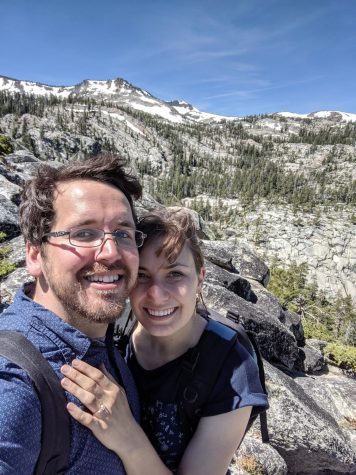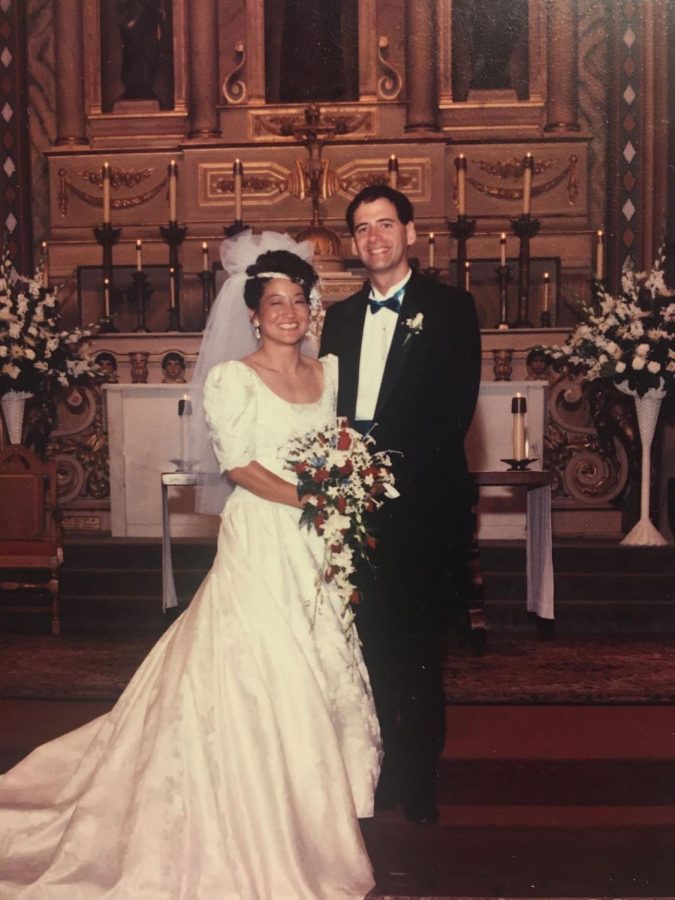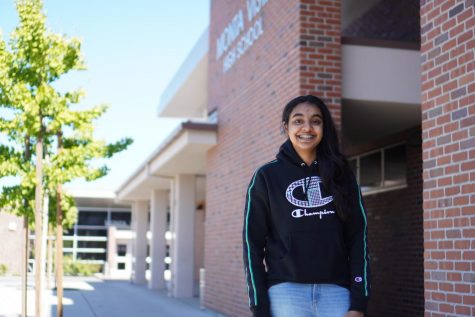Tying the knot: views on marriage
Exploring teachers’ perspectives on getting married
Math teacher Martin Jennings and his wife on their wedding day. Photo by Karen Tamaki // Used with permission
September 27, 2019
The plan was just to play tennis.
But eventually tennis led to dinner, dinner led to seeing a movie and a year later, math teacher Martin Jennings proposed to his current wife with whom he recently celebrated his 27th anniversary. Jennings understood that getting married was not a decision to be taken lightly — he proposed only when he was certain it was the right thing to do.
“A good guy friend of mine starting asking, ‘Well, how come you don’t ask her to marry you?’” Jennings said. “I said, ‘Well, I prayed about it and it’s not yet right.’ So the following summer, I went running one morning and [after] sitting around and praying a little bit, I felt like it was time to ask her to marry [me]. And I had a lot of peace about that.”
According to Jennings, there is a certain type of fulfillment that marriage brings. However, he believes that marriage does not directly equate to happiness — unmarried people can seek companionship through friends and family, and also have freedom that a married person may not have. History teacher Bonnie Belshe agrees with this idea — as an unmarried woman, she believes that her lifestyle has many advantages.
“My time is my own,” Belshe said. “What I want to do when I want to do it, how I want to do it. What I want to have in my house is entirely my choice. Where I want to spend my time, where I want to spend my money, and that’s a big one. It’s entirely my choice. I don’t have to consult with others. I don’t need to consult with others. I don’t want to consult with others.”
Belshe believes that the importance of getting married is overly emphasized by society. According to her, marriage is an important life milestone, but other accomplishments deserve equal amounts of commemoration.
“We don’t see that in the same way for ‘Congratulations on your new job,’” Belshe said. “Right? ‘Congratulations on getting another degree!’ When those are celebrated they’re not public announcements in a newspaper. We see that with engagements and marriage and births. We don’t see that with other times that we should have a celebration, when it’s an individual celebration.”
Getting married was never a question for Jennings. From a young age, he knew he wanted a lifelong partner. But after a series of bad experiences with his college relationships, Jennings began to focus less on his dating life.
“I just got at other plans and I just got to the point where I wasn’t even interested in dating other girls,” Jennings said, “I just said, ‘Oh, maybe I’ll be single.’ I had an aunt who never married and I just thought maybe I’ll be like her.”
When Jennings met his current wife, he wasn’t actively seeking out a partner. He believes that it is important to remember the magnitude of what it really means to marry someone.
“Being married is a big step, so it’s something that’s best thought about,” Jennings said. “To me, it’s a decision. Part of it is an emotion, but the major part is a decision to say ‘I’m going to love this person for the rest of my life.’ That’s different than society’s view of marriage, which is ‘Oh, I’m in love so let’s get married. I’m not so much in love anymore, so let’s get a divorce.’”
Marriage and family therapist Richard Prinz has a similar point of view — getting married and having children should be deliberate decisions. As a child, Prinz observed the struggles of his parents’ marriage and continued to witness many of his peers give into the societal pressure to get married. Although Prinz felt pressured as well, he chose to reject a recipe-like lifestyle and believes others should as well.
“There’s all this sort of pressure on people, you have to kind of understand that a little bit,” Prinz said. “It’s okay to be different.”
According to history teacher David Hartford, the moment when one realizes that marriage is the right decision will vary from person to person. For him, the first time he seriously considered marriage was when he played the board game Diplomacy with his current fiancé.

“The premise of the game is that everybody is eventually going to backstab everybody else,” Hartford said. “And a lot of times you see relationships where couples won’t backstab each other, but [my fiancé] set it up flawlessly. I didn’t see it coming. I did not think it was going to happen and she backstabbed me perfectly and she ended up winning because of it. For me, that small daily interaction — we play board games literally almost on a daily basis — but that interaction where it was perfectly set up to stab me in the back, all I had was pure appreciation and joy for it. Even though I lost horribly as a result, that was the point where I was like, ‘Yeah, this is it.’”
Similar to Jennings, Hartford believes in a careful approach — when he first considered proposing, he waited to make sure his feelings remained the same for several months. Hartford knew marriage was the right decision when he was certain that it wouldn’t drastically change his relationship. Additionally, Hartford’s perception of marriage is the same as it was when he was a child — he aspires to have a marriage like his grandparents’, who have been together for 65 years.
“My parents both were divorced multiple times, so my model was always my grandparents and [they] were very family oriented,” Hartford said. “I feel like a lot of my family values come from my grandparents as a result of that and I actually don’t think that’s changed since I was younger.”
Ultimately, Hartford believes that although marriage is a partnership, it is important to preserve each person’s individuality. He emphasizes the importance of communication in a relationship, both before and after marriage.
Like Hartford, Prinz encourages people to thoroughly consider their actions. As a married man himself, he believes that marriage has the potential to be a positive learning experience, so long as people are willing to put in the work.
“People have to be willing to change themselves,” Prinz said. “Try to understand the other person more and not just remain self-centered and think that you’re right all the time.”
Jennings also believes that communication and honesty is important in any relationship. He also stresses that marriage is much more than just a casual relationship, but rather an agreement between both people.
“Just remember that when you get married, you’re making a decision to love that person for the rest of their life and yours for better and worse,” Jennings said. “Which means just that. It’s not when it’s not convenient for you, you decide to get a divorce. That’s how I see marriage.”



















